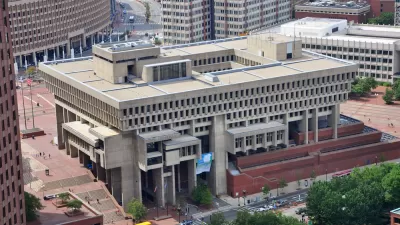The 30th edition of an annual report from the National League of Cities shows reasons to be optimistic about the fiscal condition of cities—though the arm of the Great Recession is proving to be long.
The National League of Cities this week announced their annual report on the fiscal health of cities, finding that city fiscal conditions are stabilizing, though effects of the recession are still being felt.
A post announcing the release of the report shares multiple infographics that provide a snapshot of the findings included in the report. The following factoids are included among those infographics:
- 82 percent of city finance officers are optimistic about meeting fiscal needs.
- Ending balances have reached pre-recession levels.
- Revenues have grown for three consecutive years.
On the recession that won't quite quit side of the occasion, the report also finds that the "current revenue base is only 91.6 percent of the 2006 base."
It's also worth noting that this year's report includes a comparative analysis of fiscal impacts resulting from the 1990, 2001, and 2007 recessions in addition to the analysis of this year's fiscal conditions.
For comparison's sake, the headline from the 2014 report also noted that lack of a full recovery from the recession.
FULL STORY: City Fiscal Conditions

Planetizen Federal Action Tracker
A weekly monitor of how Trump’s orders and actions are impacting planners and planning in America.

Maui's Vacation Rental Debate Turns Ugly
Verbal attacks, misinformation campaigns and fistfights plague a high-stakes debate to convert thousands of vacation rentals into long-term housing.

Restaurant Patios Were a Pandemic Win — Why Were They so Hard to Keep?
Social distancing requirements and changes in travel patterns prompted cities to pilot new uses for street and sidewalk space. Then it got complicated.

Charlottesville Temporarily Has No Zoning Code
A judge ordered the Virginia city to throw out its newly revised zoning code, leaving permitting for new development in legal limbo.

In California Battle of Housing vs. Environment, Housing Just Won
A new state law significantly limits the power of CEQA, an environmental review law that served as a powerful tool for blocking new development.

Boulder Eliminates Parking Minimums Citywide
Officials estimate the cost of building a single underground parking space at up to $100,000.
Urban Design for Planners 1: Software Tools
This six-course series explores essential urban design concepts using open source software and equips planners with the tools they need to participate fully in the urban design process.
Planning for Universal Design
Learn the tools for implementing Universal Design in planning regulations.
Heyer Gruel & Associates PA
JM Goldson LLC
Custer County Colorado
City of Camden Redevelopment Agency
City of Astoria
Transportation Research & Education Center (TREC) at Portland State University
Jefferson Parish Government
Camden Redevelopment Agency
City of Claremont




























